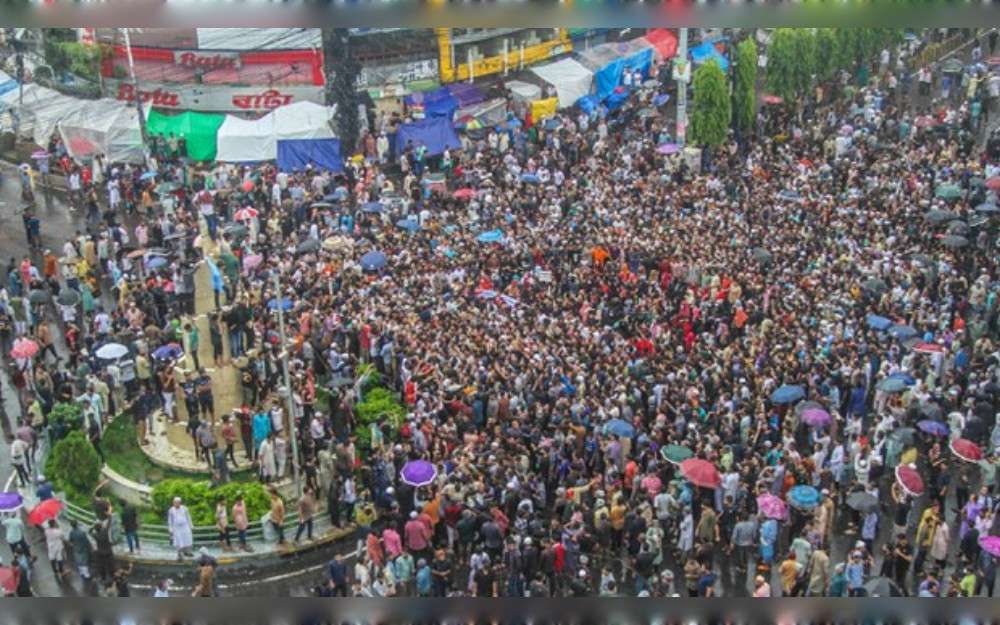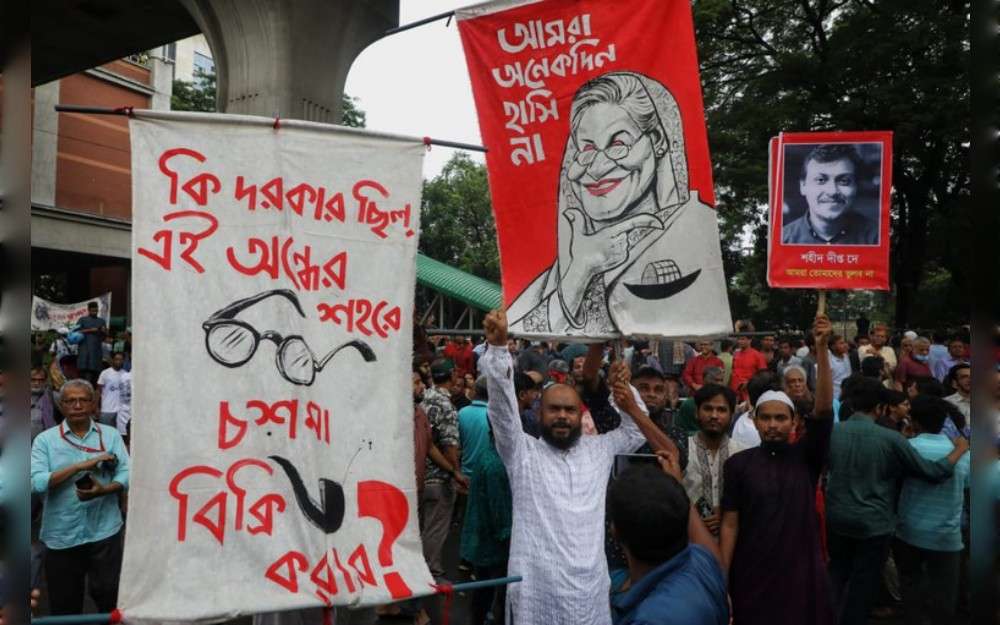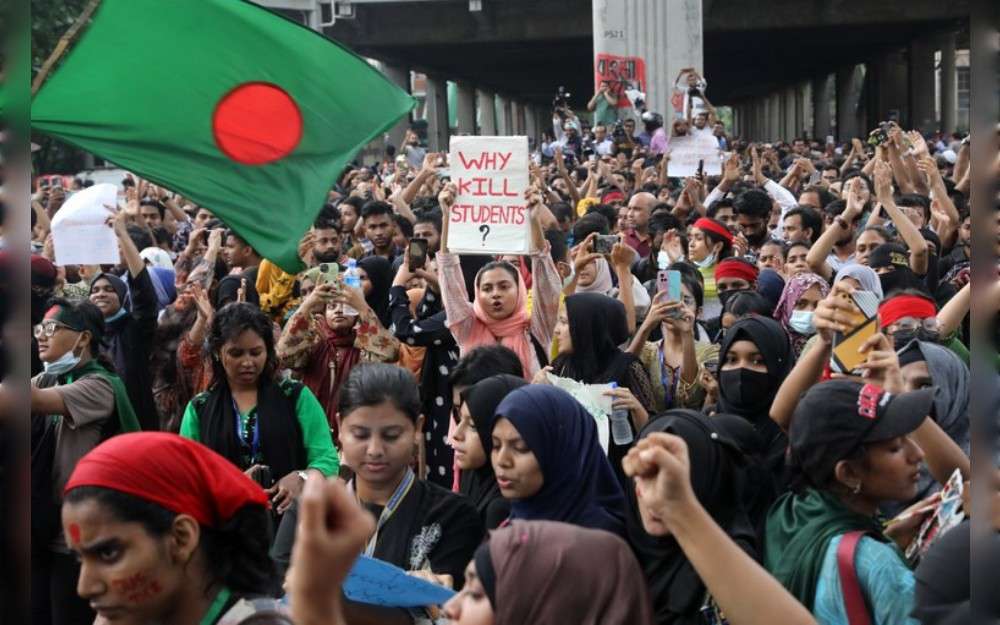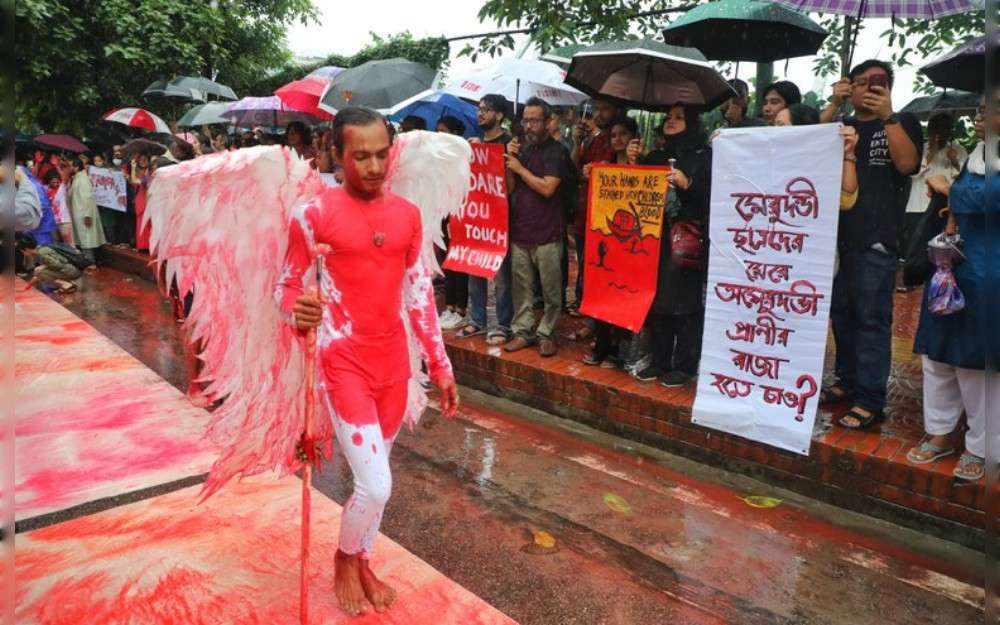Tens of thousands of people call for justice for those killed last month in clashes with security forces.
BenarNews staff/Dhaka

At least two people were killed as fresh protests exploded Friday in Bangladesh with tens of thousands demonstrating nationwide, including many who called for the Sheikh Hasina-led government’s resignation and justice for those killed in last month’s civil unrest.
More than100 people were injured as police used tear gas and rubber bullets against demonstrators, days after the international community slammed the country’s law enforcement for its response to university students’ protests last month that spiraled into clashes killing more than 210.
In many places, protesters and other witnesses told BenarNews that supporters of the ruling Awami League party aided police on Friday, with the opposing sides often coming to blows – university students last month leveled an identical accusation as causing the deadly violence.
Nizam Uddin Ahmed, a political analyst and retired professor at Chittagong University, indicated the Hasina government might have been taken aback by the continuing agitation.
“Everybody thought the protest would end as the government met the demands of the students asking for quota reform, but it is not happening,” he told BenarNews.
“But everyday students and people from other walks of life have been joining [protests]. Now the protest has spilled over to the upazilla [sub-district] level.”
A July 21 Supreme Court ruling reduced quotas in civil service to 7% from a total of 56% – these quotas had been the cause of the original protests that began the first week of July.
The government had also arrested more than 9,000 people across the country as of Sunday, most of them opposition members or supporters, and students, police and local media had reported, as analysts said it was a bid to prevent more protests.
The agitation has also widened with teachers, artists, civil society members and other professional groups such as lawyers taking to the streets and calling for accountability for last month’s violence.
Last month’s deadly clashes were the worst civil unrest the Hasina administration had seen in nearly 15 years of continuous power.
The university students alleged unprovoked attacks by police and members of the student wing of the ruling Awami League. The government, in turn, accused the opposition of fomenting the violence.
One of the two people killed on Friday, day laborer Mostak Mia, was injured when he was caught in a clash between police and students in Sylhet district in northeastern Bangladesh, said Aminul Haque Sarker, the superintendent physician of Habiganj district.
Mostak, 26, sustained a “bullet injury” and died en route to the hospital, Aminul told BenarNews. Asked whether Mostak’s injury was caused by a live or rubber bullet, the doctor said only a post-mortem may help determine that.
The second person killed Friday was an on-duty constable beaten to death by “angry” locals in the Gollamari neighborhood of Khulna city in southwestern Bangladesh, Md. Mozammel Haque Khulna, metropolitan police commissioner, told journalists.

On Friday, Obaidul Quader, the ruling Awami League’s general secretary who is road transport and bridges minister, claimed that law enforcement had been ordered not to harass or detain students “unnecessarily,” according to the state news agency Bangladesh Sangbad Sangstha (BSS).
He blamed people with ulterior motives for continuing the protests.
“[A] a vested quarter is trying to gain interest by playing the government-versus-students game. It carried out destruction capitalizing on the students,” he said, according to BSS.
Quader also said judges had been appointed for the Judicial Probe Commission to investigate last month’s killings.
The Awami League official said the scope of the Judicial Probe Commission has been extended for proper investigation of each killing.
“Any country or organization, including the United Nations, can join the probe. The government will welcome those,” he said.
Quader was alluding to a response by Stephane Dujarric, spokesman for the U.N. secretary-general, to a reporter’s question Wednesday about whether the world body would assist with an investigation into the 200-plus deaths.
“We are, of course, always ready to assist governments anywhere who may request help with different issues, and we see how we can best do that,” he said, according to a transcript of the exchange.
“In terms of independent investigations, as you know, that would require, as in any of these cases, mandate from a legislative body of this organization.”

Meanwhile, UNICEF on Friday said the Bangladesh violence has claimed the lives of at least 32 children, with many more injured.
It is everyone’s responsibility to protect children at all times, Sanjay Wijesekera, UNICEF regional director for South Asia, said in a statement.
“This is a terrible loss. … I am aware of reports that children are being detained and remind authorities that for a child, coming into contact or conflict with the law can be very frightening,” he said.
He reminded Bangladesh that it is a signatory to the U.N. Convention on the Rights of the Child.
“This means that children should not be arrested or detained based on their mere presence in any location or because of their background, religion, or acts or beliefs of their family members,” he said.
Nationwide protests
Agitation surged Friday in Dhaka, Chittagong, Khulna and about 20 additional districts.
Students chanted anti-government slogans, carried signs with photos of those who were killed, caricatures of a grinning Hasina and pictures of some ministers they held responsible for last month’s events.
In the Muslim-majority country’s capital, hundreds of protesters gathered after Friday prayers in different parts of the city such as Paltan, Baitul Mokarram, National Press Club, Science Laboratory crossing, Uttara and Mirpur.
Police fired teargas shells and rubber bullets in Paltan and Baitul Mokaram neighborhoods.
In Mirpur, protesters, especially students, were seen challenging police to shoot them. They were referring to the many casualties by gunshot last month.
In some parts of Dhaka, ruling party members came out after weeks in hiding and took positions on the streets, some with silent processions, to counter the anti-government protesters – and they said as much.

Md. Elias Uddin Mollah, a lawmaker from Hasina’s Awami League, led protests in Mirpur.
Another Awami League member and neighborhood leader, Aynal Ahmed, blamed the country’s largest faith-based party, Jamaat-e-Islami, and its student wing, Bangladesh Islami Chhatra Shibir, which were banned this week after the government alleged they were responsible for the June violence.
“We have taken a position to counter the violent attempt of the Jamaat-Shibir,” Aynal told BenarNews.
In the Dhaka suburb Uttara, protesters and ruling party supporters and police clashed Friday afternoon.
Internet restricted
Residents there told BenarNews that ruling party men and their armed “goons” had been attacking houses where some women protesters tried to take shelter when the clashes began.
“They threatened the guard of the house to get them [the protesters] out of the house or face punishment,” Ayan, one of the protesters, whose second name has been withheld for safety reasons, told BenarNews.
“The women students [then] sought help through Facebook posts.”
Early Friday evening, Netblocks, a pro-democracy organization that monitors online connectivity, reported that the Bangladesh government had again restricted internet access.
“Metrics show social media and messaging platforms Facebook, WhatsApp and Telegram are again restricted in Bangladesh with mobile data also limited; the censorship measures come as students call for protests over killings and arrests at last month’s quota protests,” it said in a post on X.
The Bangladesh government shut down the Internet for several days during last month’s deadly violence and continued to restrict access to social media sites after an uneasy calm was restored following its imposition of a curfew complete with shoot-at-sight orders.
On Friday, Students Movement Against Discrimination, the group that led the anti-quota movement, called for more nationwide demonstrations Saturday and full non-cooperation beginning Sunday.
Nizam, the former Chittagong University professor, said the protests have moved past the original concern regarding quotas in some government jobs.
“The quota is no more an issue. The issue is the killing of so many people. The government must shoulder responsibility for the killings,” Nizam said.
“It would make a serious mistake if it used repression and counter-protests.”
Copyright ©2015-2024, BenarNews. Used with the permission of BenarNews.














